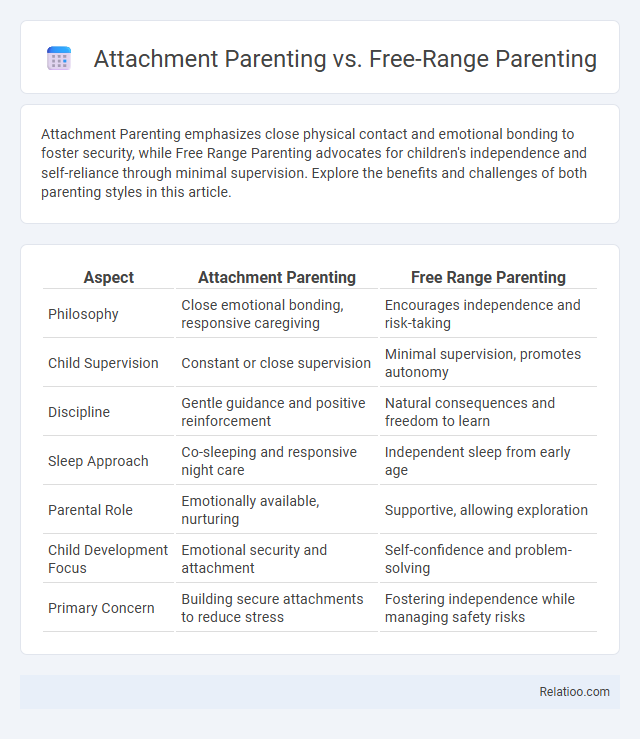Attachment Parenting emphasizes close physical contact and emotional bonding to foster security, while Free Range Parenting advocates for children's independence and self-reliance through minimal supervision. Explore the benefits and challenges of both parenting styles in this article.
Table of Comparison
| Aspect | Attachment Parenting | Free Range Parenting |
|---|---|---|
| Philosophy | Close emotional bonding, responsive caregiving | Encourages independence and risk-taking |
| Child Supervision | Constant or close supervision | Minimal supervision, promotes autonomy |
| Discipline | Gentle guidance and positive reinforcement | Natural consequences and freedom to learn |
| Sleep Approach | Co-sleeping and responsive night care | Independent sleep from early age |
| Parental Role | Emotionally available, nurturing | Supportive, allowing exploration |
| Child Development Focus | Emotional security and attachment | Self-confidence and problem-solving |
| Primary Concern | Building secure attachments to reduce stress | Fostering independence while managing safety risks |
Understanding Attachment Parenting
Attachment Parenting emphasizes building a strong emotional bond through consistent responsiveness, nurturing, and physical closeness, fostering secure attachment styles in children. Understanding Attachment Parenting helps you recognize the importance of meeting your child's emotional needs during critical developmental stages to promote trust, empathy, and social competence. This approach contrasts with Free Range Parenting, which encourages independence, and aligns closely with developmental psychology principles that prioritize age-appropriate emotional and cognitive growth.
What is Free Range Parenting?
Free Range Parenting encourages fostering your child's independence and self-reliance by allowing them to explore, take risks, and make decisions within safe boundaries, contrasting with more protective styles like Attachment Parenting. This approach aligns with developmental stages by promoting autonomy and problem-solving skills appropriate to your child's age and capabilities. Emphasizing freedom along with responsibility, Free Range Parenting aims to build confidence and resilience through gradual exposure to real-world challenges.
Core Principles of Attachment Parenting
Attachment Parenting emphasizes responsive caregiving, promoting strong emotional bonds through practices like co-sleeping, babywearing, and extended breastfeeding. It prioritizes attunement to the child's needs to foster secure attachment and emotional regulation during critical developmental stages. This approach contrasts with Free Range Parenting, which encourages independence and risk-taking as key factors in child development.
Key Features of Free Range Parenting
Free Range Parenting emphasizes fostering independence by allowing children to explore and take risks within safe boundaries, encouraging self-reliance and decision-making skills. This approach contrasts with Attachment Parenting's focus on close physical and emotional bonding and Developmental Stage Parenting's reliance on age-specific milestones to guide care. Key features of Free Range Parenting include minimal supervision, promoting autonomy, and trusting children to handle challenges appropriate to their developmental abilities.
Emotional Development: Comparing Approaches
Attachment Parenting emphasizes consistent physical closeness and emotional responsiveness, fostering secure emotional bonds that support a child's emotional regulation and trust development. Free Range Parenting encourages independence and exploration, promoting emotional resilience and self-confidence by allowing children to face challenges and learn from experiences. Developmental stage theories highlight the importance of adapting parenting strategies to a child's evolving emotional and cognitive capacities, ensuring support aligns with their readiness for autonomy and emotional complexity.
Independence and Autonomy in Parenting Styles
Attachment Parenting promotes secure emotional bonds through responsive care, fostering a child's sense of safety that supports gradual autonomy development. Free Range Parenting emphasizes early independence by encouraging exploration and self-reliance, allowing children to develop decision-making skills through real-world experiences. Developmental stage theories guide parenting approaches by aligning independence expectations with cognitive and emotional milestones, ensuring autonomy is nurtured in age-appropriate ways.
Safety and Risk: Different Perspectives
Attachment Parenting emphasizes close physical and emotional bonding to ensure Your child's safety through constant supervision and responsiveness, minimizing exposure to risks. Free Range Parenting promotes independence by allowing children to explore and take calculated risks, fostering resilience and decision-making skills while balancing safety concerns. Developmental stage theories guide parents in assessing age-appropriate risks by understanding children's cognitive and motor abilities, helping tailor safety measures to their growth phases.
Impact on Parent-Child Relationships
Attachment Parenting fosters secure emotional bonds through consistent physical closeness and responsiveness, enhancing trust and communication between parent and child. Free Range Parenting encourages independence and self-reliance, which can strengthen confidence but may challenge the parent-child bond if not balanced with emotional support. Developmental stage awareness allows parents to tailor their approach, promoting healthy autonomy and connection aligned with the child's evolving needs and capacities.
Pros and Cons of Attachment Parenting
Attachment Parenting promotes strong parent-child bonds through consistent physical closeness and responsiveness, fostering emotional security and trust in early childhood development. However, it may lead to parental burnout due to intensive caregiving demands and can potentially hinder fostering independence if boundaries are overly blurred. Balancing nurturing with gradual autonomy supports healthy developmental stages while considering the child's individual needs and family dynamics.
Advantages and Challenges of Free Range Parenting
Free Range Parenting encourages children's independence and problem-solving skills by allowing them to explore their environment with minimal adult supervision, fostering resilience and self-confidence. However, this approach faces challenges such as societal safety concerns and legal restrictions, which can limit children's freedom and create parental anxiety. Balancing the developmental need for autonomy with safety remains a key consideration in the application of Free Range Parenting strategies.

Infographic: Attachment Parenting vs Free Range Parenting
 relatioo.com
relatioo.com